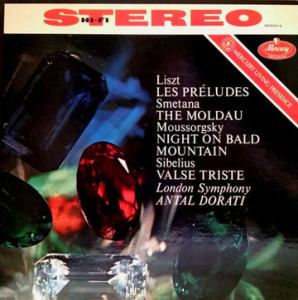 More of the music of Igor Stravinsky (1882-1971)
More of the music of Igor Stravinsky (1882-1971)
Reviews and Commentaries for The Firebird
Sonic Grade: D
Many years ago, a customer alerted me to a review Wayne Garcia wrote about various VPI platters and the rim drive, and this is what I wrote back to him:
Steve, after starting to read Wayne’s take on the platters, I came across this:
That mind-blowing epiphany that I hadn’t quite reached with the Rim Drive/Super Platter happened within seconds after I lowered the stylus onto the “Infernal Dance” episode of Stravinsky’s Firebird (45 rpm single-sided Classic Records reissue of the incomparable Dorati/LSO Mercury Living Presence recording).
That is one of my half-dozen or so favorite orchestral recordings, and I have played it countless times.
This is why I have so little faith in reviewers. I played that very record not two weeks ago (04/2010) against a good original and the recut was at best passable in comparison. If a reviewer cannot hear such an obvious difference in quality, why believe anything he has to say?
The reason we say that no reviewer can be trusted is that you cannot find a reviewer who does not say good things about demonstrably mediocre and even just plain awful records. It’s the only real evidence we have for their credibility, and the evidence is almost always damning.
I want a reviewer who knows better than to play such an underwhelming pressing and then waste my time telling me about it. He should tell us what a good record sounds like with this equipment mod. Then I might give more credence to what he has to say.
Reviewer malpractice? We’ve been writing about it for more than 25 years.
P.S.
This is one of the Classic Records titles on Harry Pearson’s TAS List of Super Discs (!).
P.P.S.
Allow me to quote a writer with his own website devoted to explaining and judging classical recordings of all kinds. His initials are A.S. for those of you who have been to his site.
Classic Records Reissues (both 33 and 45 RPM) – These are, by far, the best sounding Mercury pressings. Unfortunately, only six records were ever released by Classic. Three of them (Ravel, Prokofiev and Stravinsky) are among the very finest sounding records ever made by anyone. Every audiophile (with a turntable) should have these “big three”.
Obviously we could not disagree more. I’ve played all six of the Classic Mercury’s. The Chabrier, Ravel and Prokofiev titles are actually even worse than the Stravinsky we reviewed.
This same reviewer raved about a record we thought had godawful sound, Romantic Russia on MoFi, a label that never met an orchestral string section it didn’t think needed brightening.
Find me a Mobile Fidelity classical record with that little SR/2 in the dead wax that does not have bright string tone. I have yet to hear one.
What is it with audiophile record reviewers? They seem to be taken in by the most unnatural sounding pressings. The world is full of wonderful vintage pressings that have no such problems. If you are an audiophile who feels himself qualified to write about records, shouldn’t you at least be able to hear the difference between a phony audiophile pressing and the vintage pressings it supposedly improved?
The Absolute Sound is a good example of this kind of malpractice. Most of the records on the old list were vintage pressings, and most of the classical titles set a high standard (the popular titles not so much). Now it’s full of second- and third-rate heavy vinyl recuts that are about as far from Super Discs as you can get.
We went to some pains to show the audiophile community exactly what is wrong with this famous audiophile favorite, and how they could learn to spot one of its most objectionable shortcomings.
The fact that one of the “bad” versions of the album is on the TAS List, side by side with the Living Stereo, is a sign that the standards currently in effect over there have fallen about as far as they can fall.
One of the greatest piano concertos ever recorded is on the list, but so is this unbelievably bad Heavy Vinyl repress of it. Surely somebody at The Absolute Sound can hear the difference. It’s not subtle.
But maybe it is to them. And that’s a sign that they should stop promoting the equipment they write about. Judging by their inability to tell a good record from a bad one, it can’t be very good.
Further Reading
Below you will find our reviews of the more than 200 Heavy Vinyl pressings we’ve played over the years. Feel free to pick your poison.
And finally,
A Confession
Even as recently as the early 2000s, we were still impressed with many of the better Heavy Vinyl pressings. If we’d never made the progress we’ve worked so hard to make over the course of the last twenty or more years, perhaps we would find more merit in the Heavy Vinyl reissues so many audiophiles seem impressed by.
We’ll never know of course; that’s a bell that can be unrung. We did the work, we can’t undo it, and the system that resulted from it is merciless in revealing the truth — that these newer pressings are second-rate at best and much more often than not third-rate and even worse.
Some audiophile records sound so bad, I was pissed off enough to create a special list for them.
Setting higher standards — no, being able to set higher standards — in our minds is a clear mark of progress. Judging by the hundreds of letters we’ve received, especially the ones comparing our records to their Heavy Vinyl and Half-Speed mastered counterparts, we know that our customers see things the same way.








 More of the music of Igor Stravinsky (1882-1971)
More of the music of Igor Stravinsky (1882-1971)